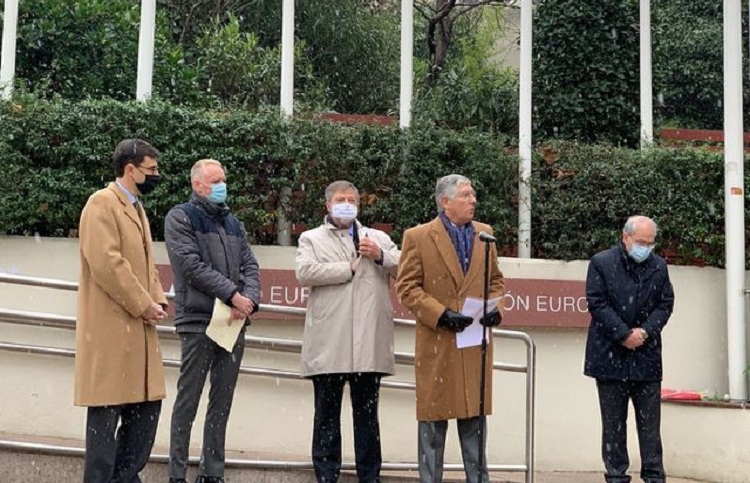The Diplomat
The headquarters of the European institutions in Spain hosted yesterday the solemn flag raising ceremony in honour of the start of the Portuguese Presidency of the Council, at which the German flag was also lowered to symbolise the changeover between presidencies.
During the event, the Secretary of State for the European Union, Juan González-Barba, wished “the best of luck to a neighbouring and brotherly country like Portugal in its presidency of the Council of the EU”. “We fully share the social approach of the Portuguese Presidency and we hope that Europeans will move forward together this semester in the fight against COVID-19 and its economic consequences”, he added.
For his part, the Portuguese Ambassador to Spain, João Mira-Gomes, stressed that “the Portuguese Presidency is starting under the sign of hope in overcoming the pandemic, as well as in economic recovery”. “After the important political agreements reached on the reconstruction funds, it is up to us to put in place the instruments that will allow recovery to be launched, in the form of effective support for citizens and businesses”, he continued. “We also want to strengthen the European social model, so that no one is left behind, and to work on better cooperation in the field of health. It is time to act, for a fair, green and digital recovery”, he added.
The German Ambassador, Wolfgang Dold, said he was “convinced” that Europeans have emerged “more united” from the German semester, “which was so difficult because of the COVID”, and stressed that “the most important thing is that we have agreed on a plan to relaunch the economy that is unprecedented in history, and that we have launched a common vaccination strategy for the entire European Union”, while “we have agreed on new objectives for climate protection and have successfully concluded negotiations on a treaty on a new partnership with the United Kingdom”.
The Head of Institutional Relations of the European Parliament Office in Spain. Juergen Foecking, stated that “from the European institutions in Spain, the Portuguese Presidency is an opportunity to promote an Iberian debate within the framework of the priorities for the Conference on the Future of the EU”. Finally, the Director of the European Commission Representation in Spain, Francisco Fonseca, said that “the German Presidency has fulfilled its objectives” with the approval of the EU budget and the Recovery Plan and with the conclusion of the negotiation of the agreement with the United Kingdom and the Portuguese Presidency “will lead the EU in critical times, with the implementation of the 750 billion euro package, which will help the EU to overcome the crisis and at the same time ensure the ecological and digital transition of our economies”.







